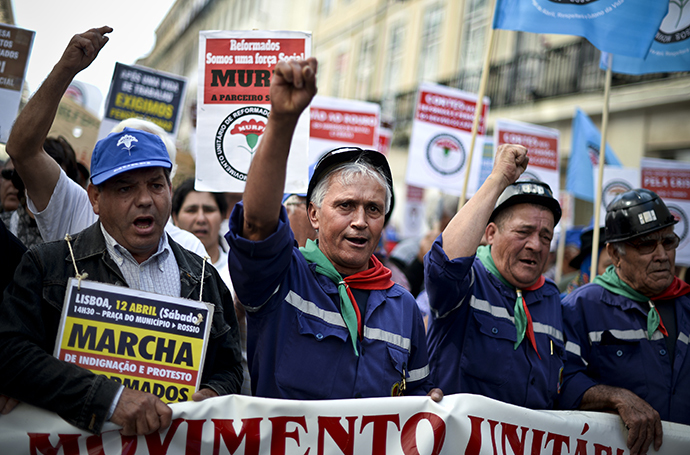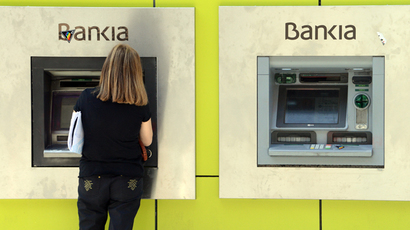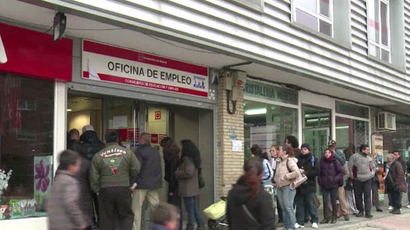Portugal poised to exit bailout program, austerity battle scars remain
Europe’s western-most country is poised to exit its 78 billion euro ($108 billion) international bailout program, which officially ends May 17. While politicians remain positive, the economy still exhibits deep wounds left from austerity policies.
Berlin and Brussels are already hailing Portugal’s "clean exit" from its bailout by the EU, the International Monetary Fund, and the ECB, and have started their last quarterly evaluation review.
Tough austerity cuts have decreased living standards, cut pensions, and decreased wages over the past 3 years.
After Ireland and Spain Portugal will be the third eurozone country to leave its bailout program, but whether it will be "clean"- that is, require no extra credit lines from the EU, remains to be seen.
Portugal’s politicians will weigh the pros and cons and will take this decision by May 5 when they meet with eurozone finance ministers in Brussels.
Similar to Ireland, the country has been saving up to help cover next year’s finance needs, and already has 15 billion to cover them.
“There is a great need in Brussels and Berlin and other capitals to present Portugal and Ireland as success stories. They will claim that their reforms in Portugal have been a success- well, they haven’t, they have destroyed the society and economy,” Rui Tavares, an independent Portuguese MEP told RT.
Many economic figures are testimony that Portugal is on the way to healing as it prepares to shake free of its bailout shackles and exit its most brutal recession in 40 years.
Economic growth increased 0.5 percent in the first quarter of 2014, exports expanded 4.6 percent, and even tourism was boosted 4.2 percent. The country has certainly come a long way- just last year EU economists were holding talks on a possible second bailout for Lisbon.
Still, the economy needs to improve much more. Unemployment still hovers around 15 percent and youth unemployment is still high at 35 percent.
“There is still a long way to go before you state that Portugal is back," Bruno Faria Lopes, a Lisbon-based economics journalist, told RT.
“You have to remember, even if Portugal does a clean exit from this bailout program next month, it still has a lot an awful lot of problems. Its running a budget deficit of over 4 percent which means it has to make 16 billion worth of cuts by the end of 2015,” Rui Tavares told RT.
“The depression is not only economic, it's also a psychological depression,” Tavares said.

Demographic time bomb
Portugal’s high unemployment has forced the workforce to look abroad for work opportunities, increasing emigration.
During the past 3 years, the work force has defected for more robust neighboring economies in record numbers. In 2012 this reached a new high of 120,000 émigrés, which was coupled with Portugal’s lowest birth rate.
“We have had as many people emigrating from Portugal since the 60s when we had a colonial war and a brutal dictatorship. In one year, more than 1 percent of the population going away– the most skilled, most educated part of society,” Tavares told RT.
Another harrowing reality is that while many people struggle with tough austerity measures, a disproportionate amount of people are getting richer and richer. In Portugal, the top 20 percent make six times more than the bottom 20 percent.
Bond boost and credit rating
On Wednesday, Portugal issued €750m worth of 10 year bonds at its first regular debt auction since requesting eurozone and IMF assistance in 2011. Despite a maximum take-up, today's bond placements enjoyed a yield of 3.575 percent, the lowest on record in a Portuguese auction of that maturity, and significantly lower than the secondary market yield of 3.68 percent registered just beforehand.
“It was a good result which gives us confidence in the future,” Prime Minister Pedro Passos Coelho said on Wednesday.
Emulating Ireland’s success may prove difficult for Portugal, which doesn’t find itself in the exact same financial situation.
Portugal’s sovereign debt is still rated below investment grade by Standard & Poor’s, Moody’s, and the Fitch ratings agencies. Moody’s elevated Ireland from “junk” status to Baa3 - the lowest investment grade before it exited its bailout.
Fitch recently changed Portugal’s outlook from "negative" to "positive".














